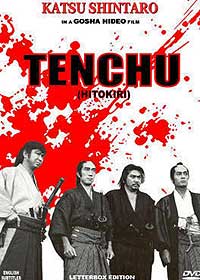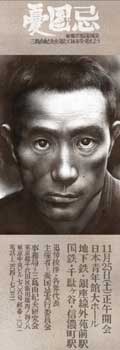 The widow of the great writer Yukio Mishima (1925-1970), overly protective of the estate, tried to get rid of evidence of her husband's homosexuality & otherwise "clean up" his image. Among her dastardly deeds intended for her own well-being rather than to honor her husband, she attempted to suppress Hideo Gosha's Tenchu! (Hitokiri, 1969).
The widow of the great writer Yukio Mishima (1925-1970), overly protective of the estate, tried to get rid of evidence of her husband's homosexuality & otherwise "clean up" his image. Among her dastardly deeds intended for her own well-being rather than to honor her husband, she attempted to suppress Hideo Gosha's Tenchu! (Hitokiri, 1969).
Mishima plays an intensely honorable samurai who commits seppuku over a crime he didn't commit, because of the dishonor of even being charged. Since in real life Mishima had his boyfriend serve as beheading "second" when he completed the seppuku ritual for real, it might be comprehensible that his widow would rather not have this film circulating.
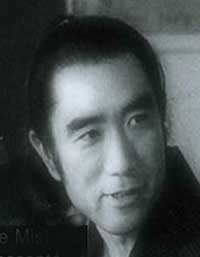 In part because it was such a difficult film to get to see for many years, it became increasingly notorious as a cult classic, available only through an underground black market, rumored again & again to be one of Gosha's best. In part because it was such a difficult film to get to see for many years, it became increasingly notorious as a cult classic, available only through an underground black market, rumored again & again to be one of Gosha's best.
It's not a bad film by any means, but really only Mishima's incredibly appealing & elegant performance makes it special, despite that he's only a side-character, not the star.
The star is pretty cool, too, though, none other than Shintaro Katsu of Zatoichi fame. To follow the plot requires the viewer to have a bit of knowledge of Japanese history at the end of the Tokugawa era. This is elementary knowledge in Japan & Gosha does not explain it for western viewers.
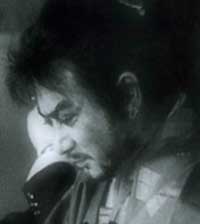 Katsu plays Izo Okada, one of "The Four Hitokiri" or man-killers, who helped bring down the Tokugawa shogunate, paving the way for the Meiji Restoration. When one of the Hitokiri assassinated a target, he would yell, "Tenchu!" which means "Heaven's Punishment!" Katsu plays Izo Okada, one of "The Four Hitokiri" or man-killers, who helped bring down the Tokugawa shogunate, paving the way for the Meiji Restoration. When one of the Hitokiri assassinated a target, he would yell, "Tenchu!" which means "Heaven's Punishment!"
Mishima's character is Shimbei Tanaka, another of The Four Hitokiri, & since Mishima really was that sort of right-wing advocate of the restoration of the imperialism, the intrigue of his performance just has many reasons to attract greater attention than the film's putative star Katsushin.
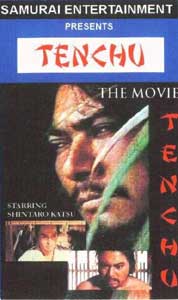 Izo Okada was a rough & almost animalistic ronin, but of very great strength, & was "tamed" by Hampeita Takechi (Tatsuya Nakadai), head of the Tosa loyalists, who transformed Izo into a veritable vassal to revolution. Izo Okada was a rough & almost animalistic ronin, but of very great strength, & was "tamed" by Hampeita Takechi (Tatsuya Nakadai), head of the Tosa loyalists, who transformed Izo into a veritable vassal to revolution.
Ryoma Sakamoto (Yujiro Ishihara) was Izo's friend since childhood. He is a decent fellow who has laid plans that will help lead Japan through its necessary changes with minimal bloodshed, toward a place where the medieval class system no longer has meaning, when there will be no distinctions between Samurai or Peasant, & all people are equal.
This isn't exactly what the loyalists had in mind, however. They imagined themselves as a lordly new class of warriors upholding the Emperor, rather than cast into a world where peasant, merchant, & warrior were regarded as equals.
Slowly these men will turn against the only truly revolutionary figure among otherwise backward-seeking radicals. The rapid choreography for the samurai swordplay action is eye-popping & first-rate.
Elegant highly artful cinematography keeps it from looking as gory as it obviously is. Izo is the most ruthless of all the killers, despite his fondness for Ryoma & his desire to believe in Ryoma's utopianism.
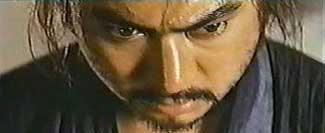 Izo's only calm moments are with the prostitute Omino (Mitsuko Baisho), who is a bit outside the tone of the film at large, & a character who seems a bit forced merely to bring a leading lady into the tale. She's nevertheless one of the finest actors on board & gives a nuanced performance of considerable interest. Izo's only calm moments are with the prostitute Omino (Mitsuko Baisho), who is a bit outside the tone of the film at large, & a character who seems a bit forced merely to bring a leading lady into the tale. She's nevertheless one of the finest actors on board & gives a nuanced performance of considerable interest.
Gosha directed this starring vehicle for Katsu at Katsu's own production company, of the many times Izo Okada has been portrayed on the screen, none quite equal this.
He's maniacal, bloodthirsty, vain, animalistic; but at the same tiem he's a type of innocent, easily drawn toward compassion under the influence of the compassionate, but then as easily influenced the revert to bloodthirstiness.
Sakamoto is like a good angel at his right shoulder, Takechi like an angel of darkness at his right shoulder, & Okada sways between potentials.
copyright © by Paghat the Ratgirl
|

